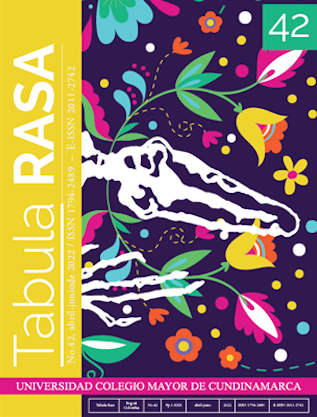Mostrar biografía de los autores
Este artículo analiza la complementariedad del marxismo (la versión democrática del siglo XXI) y la decolonización (la decolonialidad radical del siglo XXI) como teorías vivas e ideas verdaderas de liberación. Se centra en las articulaciones del marxismo y la liberación negra hechas por figuras negras selectas, como Aimé Cesaire, Abdel Khaliq Mahgoub, Amílcar Cabral y Walter Rodney. Dichas figuras produjeron lo que aquí se presenta como decolonialidad marxista negra. En el centro de esta decolonialidad marxista negra se encuentran las intersecciones del marxismo y la decolonización para ahondar el análisis del capitalismo y el colonialismo como fuentes inextricablemente entrelazadas de problemas modernos. No solo se amplía el marxismo ortodoxo para reflexionar sobre la condición Negra sino que también se democratiza para abrirlo y acoger otros movimientos de liberación antirracistas, antiesclavitud, anticapitalistas, anticolonialistas y sexistas antiheteropatriarcales. La decolonización del siglo XX también se extiende más allá de su captura por las elites burguesas que quisieron reemplazar los colonialistas blancos sin cambiar el sistema-mundo moderno con sus jerarquías raciales y su ideología de género.
Visitas del artículo 132 | Visitas PDF 88
Descargas
- Amin, S. (2019). Only people make their own history: Writings on capitalism, imperialism and revolution. New York: Monthly Review Press.
- Becker, M. (2017). Twentieth century Latin American revolutions. New York & London: Rowman & Littlefield Publishers.
- Cabral, A. (1979). Unity and struggle: Speeches and writings of Amilcar Cabral. New York: Monthly Review Press.
- Cabral, A. (1973). Return to the source: Selected speeches by Amilcar Cabral. New York: Monthly Review Press.
- Cabral, A. (1972). Revolution in Guinea: Selected texts by Amilcar Cabral. New York: Monthly Review Press.
- Cabral, A. (1966). “The weapon of theory.” Conferencia dictada en la Primera conferencia Tricontinental de los Pueblos de Asia, África y América Latina. La Habana, Cuba, https://www.marxists.org/subject/africa/cabral/1966/weapon-theory.htm
- Cesaire. A. (2012 [1956]). “Letter to Maurice Theroz: General Secretary of the French Communist Party, October 24, 1956.” In S. M. Hassan. “How to liberate Marx from his eurocentrism: Notes on Africa/Black Marxism”, DOCUMENTA, 13, 32-36.
- Cesaire, A. (2000 [1955]). Discourse on colonialism. New York: Monthly Review Press.
- Cock, J. & Luxton, M. (2013). “Marxism and feminism: ‘Unhappy marriage’ or creative partnership?” In M. Williams & V. Satgar (Eds.), Marxisms in the 21st century: Crisis, critique and struggle (pp.116-142). Johannesburg: Wits University Press.
- Dabashi, H. (2019). Europe and its shadows: Coloniality after empire. London: Pluto Press. Dussel, E. (1995). The invention of the Americas: Eclipse of the “Other” and the myth of modernity. New York: Continuum.
- Dussel, E. (1993). Eurocentrism and modernity (Introduction to the Frankfurt Lectures). Boundary 2, 20 (3), 65-76.
- Fanon, F. (1968). The wretched of the Earth. New York: Grove Press.
- Foster, B. Clark, B. & Holleman, H. (2020). “Marx and the Indigenous.” Monthly Review, 7(9), 1-28
- Fukuyama, F. (1992). The end of history and the last man. London: Penguin Books.
- Green, E. F. (1998). Socialist internationalism: Theoria and praxis in Soviet international law. Yale Journal of International Law, 13(2), 306-331.
- Grosfoguel, R. (2007). The epistemic decolonial turn: Beyond political-economy paradigms. Cultural Studies, 21(2-3), 211-223.
- International Marxist Tendency (2010). “For the Fifth International.” In: http://www.marxist.com/for-the-international/print.htm
- Lenin, V. I. (1916). Imperialism: The highest stage of capitalism. New York: Monthly Review Press.
- Maldonado-Torres, N. (2011). Thinking through the decolonial turn: Post-Continental interventions in theory, philosophy, and critique—An introduction. Transmodernity, 1(2), 1-15. https://doi.org/10.5070/T412011805
- Mahgoub, A. K. (2012 [1959]). Abdel Khaliq Mahgoub: By virtue of marxism, your honor. In S. M. Hassan. How to liberate Marx from his eurocentrism: Notes on Africa/Black marxism., Documenta, 13 (pp.15-29). Berlin: Hatje Cantz
- Ndlovu-Gatsheni, S. J. (2020). Decolonization, Development and knowledge in Africa: Turning over a leaf. New York & London: Routledge.
- Ndlovu-Gatsheni, S. J. (2018). Epistemic freedom in Africa: Deprovincialization and decolonization. London & New York: Routledge.
- Ndlovu-Gatsheni, S. J. (2016). The decolonial Mandela: Peace, justice and the politics of life. Oxford & New York: Berghahn Books.
- Ndlovu-Gatsheni, S. J. (2013a). Coloniality of power in postcolonial Africa: Myths of decolonization. Dakar: Codesria Books.
- Ndlovu-Gatsheni, S. J. (2013b). Empire, global coloniality and African subjectivity. New York & Oxford: Berghahn Books.
- Ndlovu-Gatsheni, S. J. & Ndlovu, M. (Eds.) (2022). Marxism and decolonization in the 21st Century: Living theories and true ideas. London & New York: Routledge.
- Nkrumah, K. (1965). Neo-colonialism: The last stage of imperialism. London: Panaf Press. Nzongola-Ntalaja. (1984). Amilcar Cabral and the theory of national liberation struggle. Latin American Perspectives, 41(11), 43-54.
- Quijano, A. (2000). Coloniality of power, eurocentrism, and Latin America. Nepantla: Views from the South, 1(3), 533-579.
- Rodney, W. (1975). Marxism and African liberation. In: https://www.marxists.org/subject/africa/rodney-walter/works/marxismandafrica.htm (Accessed 27/12/2020).
- Robinson, C. J. (2000). Black Marxism: The making of the Black radical tradition. New York: The University of North Carolina Press.
- Santos, B. S. (20218). The end of the cognitive empire: The coming of age of epistemologies of the South. Durham & London: Duke University Press.
- Said, E. W. (1994). Traveling theory reconsidered. In R. Polhemus & R. Henke (Eds.), Critical representations (pp.197-214). Stanford: Stanford University Press.
- Sewell, R. (2014). 4th August 1914: The great betrayal and collapse of the Second International. https://www.marxist.com/4th-august-1914-the-great-betrayal-and-collapse-of-the-second-international.htm
- Wallerstein, I. (1984). The politics of the world-economy: The states, the movements and the civilizations. Cambridge: Cambridge University Press.
- Williams, M. (2013). Marxism and democracy: Liberal, vanguard or direct? In M. Williams & V. Satgar (Eds.). Marxisms in the 21st century: Crisis, critique and struggle (pp.16-33). Johannesburg: Wits University Press.




